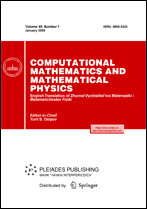|
This article is cited in 3 scientific papers (total in 3 papers)
Adaptive $hp$-finite element method for solving boundary value problems for the stationary reaction–diffusion equation
N. D. Zolotareva, E. S. Nikolaev
Faculty of Computational Mathematics and Cybernetics, Moscow State University, Moscow, 119992, Russia
Abstract:
An adaptive $hp$-finite element method with finite-polynomial basis functions is constructed for finding a highly accurate solution of a boundary value problem for the stationary reaction–diffusion equation. Adaptive strategies are proposed for constructing a sequence of finite-dimensional subspaces based on the use of correction indicators, i.e., quantities evaluating the degree to which a chosen characteristic of the approximate solution varies when the subspace is expanded by adding new test basis functions. Efficient algorithms for computing correction indicators are described. The method is intended for problems whose solutions have a local singularity, for example, for singularly perturbed boundary value problems.
Key words:
finite element method, adaptive methods, correction indicators, stationary one-dimen-sional reaction–diffusion equations, singularly perturbed boundary value problems.
Received: 11.02.2015
Citation:
N. D. Zolotareva, E. S. Nikolaev, “Adaptive $hp$-finite element method for solving boundary value problems for the stationary reaction–diffusion equation”, Zh. Vychisl. Mat. Mat. Fiz., 55:9 (2015), 1512–1529; Comput. Math. Math. Phys., 55:9 (2015), 1484–1500
Linking options:
https://www.mathnet.ru/eng/zvmmf10265 https://www.mathnet.ru/eng/zvmmf/v55/i9/p1512
|


|





 Contact us:
Contact us: Terms of Use
Terms of Use
 Registration to the website
Registration to the website Logotypes
Logotypes








 Citation in format
Citation in format 
